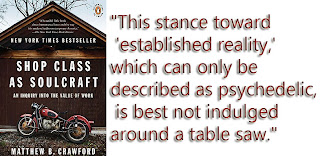The transition from institutionalized, single platform education technology to a decentralized model is in full swing at our school. I’m getting blow back from various teachers who want things to remain as they’ve always been. I don’t think they mean ditto machines, facsimiles and telegrams, but they might. There is always a tendency to fight advances in technology, it’s difficult to change ingrained habits.
The difference between this and previous technological shifts is that we’ve institutionalized helplessness into educational digital technology. We’ve convinced teachers that computers are an appliance and networking is a utility. We treat internet access the same way we treat electricity or water delivery; it’s off loaded to a bureaucracy who guarantees delivery. As the old guard retires and their traditional thinking around passive technology use fades, we are left with whole generations of teachers who have been taught to do nothing except sit on the institutionally provided bus and go where it takes them. Complaining about it is about all they can do.
Any decision making about educational technology has long been taken from teachers. Digital learning tools are seen as remotely operated apparatus that should be dropped the moment they don’t perform as expected.
When I suggest that teachers can get off the #edtech bus and drive their own educational technology they get anxious; driving a car takes a lot of effort compared to sitting on the bus. You not only have to drive it, but you’ve got to look after it too, make sure it has gas, service it, take ownership of it. The reward is much finer control over how you travel on your journey.
If you want to get where you’re going (making education relevant and useful to your students?) driving your technology will get you there much sooner. You’ll get to decide what vehicle to take, what options to put on it, and even how you want various technologies to enhance your teaching. Diversification of technology is vital to a better understanding of what it is and how to use it effectively. Digital technology isn’t one app or one platform, it is a sea change in how we access and share information.
Driving your own technology usage does take a lot more effort than sitting on the #edtech bus, though it’s just a different kind of effort. All that energy you used to expend on worrying when the bus would show up? or why it’s so old and dilapidated? You can now spend deciding what to get, what options you want and how you want to implement it. You get to decide what, when and how your students are using technology to enhance their learning; you get to actually control your digital learning environment.
That last bit is perhaps the most enjoyable part of driving your own technology use; being able to control your #edtech environment is a key factor in customizing 21st Century learning to suit your students.
If we treated classrooms the way we treat digital learning environments, all rooms would be exactly the same, with the same seating plans, the same chalk boards and the same size. Those classrooms would also be years out of date, and the teacher couldn’t move a table or chair if they wanted to, because they’d all be nailed to the floor. If you dare to ask why the furniture is nailed to the floor you’d be reprimanded with a fear based diatribe on how not keeping everything locked down and the same is potentially dangerous to your students and staff.
| A Digital Skills Continuum: Differentiation of technology is a key to technical fluency! |
If you’re teaching using technology you’re also teaching technology, and it would behove you to know what’s under the hood. Being ignorant of the machinery you’re operating makes you a very bad driver indeed. You don’t necessarily need to be a full-on mechanic, but a tinkerer’s mindset allows you to understand and look after your own needs in terms of the technology you use.
There are going to be some crashes with all these new drivers coming onto the road, but each collision will result in a learning experience. I only hope that teachers who are inexperienced are willing to look past the messiness of their own learning to the possibilities opening up to them in a digital world. At some point we’ll tip over and teachers will accept that competence in technology isn’t someone else’s job but an integral part of their profession in the twenty-first century, just as it has become a basic fluency in so many other professions.





 In schools we create artificial learning environments for our children that they know to be contrived and undeserving of their full attention and engagement… Without the opportunity to learn through the hands, the world remains abstract and distant, and the passions for learning will not be engaged – Doug Stowe (
In schools we create artificial learning environments for our children that they know to be contrived and undeserving of their full attention and engagement… Without the opportunity to learn through the hands, the world remains abstract and distant, and the passions for learning will not be engaged – Doug Stowe (










